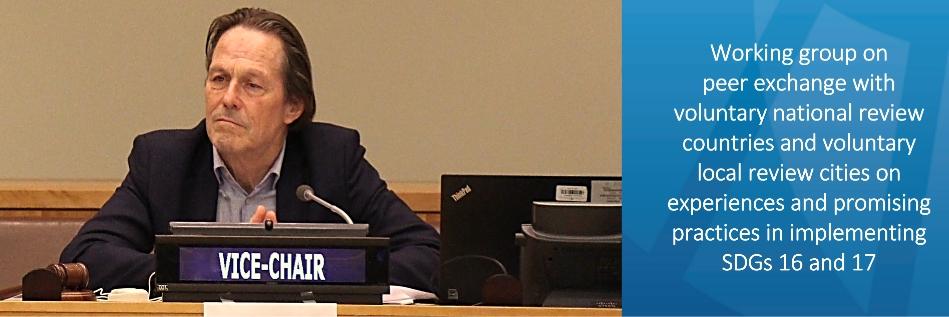Current work
Engaging voluntary national review countries and voluntary local review cities: In support of the 2025 ECOSOC cycle of work, the CEPA working group will continue to support peer exchanges among voluntary national review (VNR) countries and voluntary local review (VLR) cities on experiences and promising practices in implementing institutional aspects of SDGs 16 and 17.
Background
The high-level political forum on sustainable development (HLPF) has a central role in the follow-up and review of the 2030 Agenda at the global level. One of its central features is the VNR process by which countries take stock and assess progress and challenges in the implementation of the Sustainable Development Goals.
Since 2019, the Committee has been organizing exchanges with VNR countries during its annual session, and, more recently, also with VLR cities. Selected countries and cities are invited to share relevant aspects of their draft voluntary reviews, highlighting in particular institutional aspects of SDG 16 and SDG 17, giving particular attention to the cross-cutting nature of all the Goals. CEPA members contribute with observations and/or suggest solutions to the challenges presented based on their collective knowledge and expertise.
Peer exchanges
- CEPA 24th session (2025): Brazil, Burkina Faso, Namibia, Zimbabwe
In 2025, the Committee facilitated an interactive peer exchange with Namibia and Burkina Faso on governance perspectives on building national resilience within a global context of multiple crises. The focus was on measures, policies and strategies that had been undertaken to integrate reflections of a long-term vision of society into policy processes and deliver on long-term objectives while also being responsive to immediate needs and priorities. A second peer exchange, with Brazil and Zimbabwe, examined the question of institutionalizing commitments to safeguarding of the needs and interests of future generations with a focus on the ways governments were strengthening the science-policy interface and leveraging science, data and strategic foresight to accelerate implementation of the 2030 Agenda.
- CEPA 23rd session (2024): Romania and Azerbaijan; Malawi and Sierra Leone; São Paulo, Brazil and Tokyo Metropolitan Government, Japan
In 2024, the Committee paired up four interested countries and two cities for direct moderated peer exchange or “twin pairing”. Each pair discussed concrete challenges and operational strategies regarding one selected CEPA governance principle, exchanging their experiences and good practices, followed by reflections and suggestions from Committee members. The principles of effective governance discussed were: competence, leaving no one behind and subsidiarity. Discussions were also linked to the SDGs to be reviewed in depth at the 2024 HLPF.
- CEPA 22nd session (2023): Guyana and Rwanda; Saudi Arabia and Malaysia; Barcelona and Buenos Aires
In 2023, the Committee for the first time paired up four interested countries and two cities for direct moderated peer exchange or “twin pairing”. Each pair discussed concrete challenges and operational strategies regarding one selected CEPA governance principle, exchanging their experiences and good practices, followed by reflections and suggestions from Committee members. The principles of effective governance discussed were: leaving no one behind, sound policymaking, and participation. Discussions were also linked to the SDGs to be reviewed in depth at the 2023 HLPF.
- CEPA 21st session (2022): Italy; Morocco; Mexico City; Shah Alam City (Malaysia)
In 2022, the Committee engaged in a dialogue with two VNR countries and two VLR cities with the objective of promoting interaction on institutional aspects of SDG 16. Countries and cities presented concrete experiences for discussion. In addition, Committee members and observers agreed on the potential merits of a voluntary Committee-led peer exchange platform on institutional aspects of Goal 16. Emphasis was placed on ensuring synergies with existing peer review mechanisms, such as the African Peer Review Mechanism and OECD DAC peer review.
- CEPA 20th session (2021): Azerbaijan, Colombia, Indonesia
In 2021, the Committee engaged in a dialogue with three voluntary national review countries with the objective of promoting direct interaction on the institutional aspects of Sustainable Development Goal 16. The countries each presented concrete experiences for discussion. The dialogue illustrated that much progress was being made on the quality of national public administration and governance, with contextualized solutions and priorities, and that exchange of experiences between countries could catalyse progress.
- CEPA 18th session (2019): Azerbaijan, Chile, Croatia, Côte d’Ivoire, Dominican Republic, Guatemala, Iceland, Indonesia, Liechtenstein and Uruguay
In 2019, the Committee engaged in a dialogue with 10 VNR countries with the objective of promoting interaction on institutional successes and challenges that the countries themselves had identified. The countries each presented a concrete case for discussion.
What action does ECOSOC recommend?
ECOSOC emphasizes that effective implementation of the 2030 Agenda requires strengthened multilateral cooperation based on solidarity, shared responsibility and mutual accountability, particularly in the light of increasing transboundary risks and global interconnectedness, and calls for increased efforts to support national and international peer exchanges and peer learning on the implementation of the Sustainable Development Goals and effective governance for sustainable development, including through cooperation with existing international networks (ECOSOC resolution 2025/31, para. 10).
ECOSOC invites the subsidiary bodies to more systematically invite countries conducting Voluntary National Reviews (VNRs) at the HLPF to participate in their session and engage in a dialogue on the implementation of the SDGs most closely related to their work. This would help to maximize peer learning on policy experiences emanating from the VNRs (ECOSOC decision 2022/334 and letter dated 27 May 2022 from the Vice President of ECOSOC addressed to all Member States).
- Related meetings

HLPF 2023 side event: "Strengthening the VNR reports and processes: Recommendations for a new approach" was held on 19 July from 1:15 to 2:30 pm (EDT) at UN Headquarters in New York. More information can be found here.

HLPF 2023 VNR Lab: "Principles of effective governance in VNRs: Enhancing policy coherence for sustainable development" was held on18 July 2023 from 8 to 9 am (EDT) at UN Headquarters in New York. More information can be found here.

HLPF 2022 VNR Lab: Recent innovations in institutional arrangements for SDG implementation" was held virtually on 15 July 2022 from 8 to 9 am (EDT). More information can be found here.
 Welcome to the United Nations
Welcome to the United Nations
